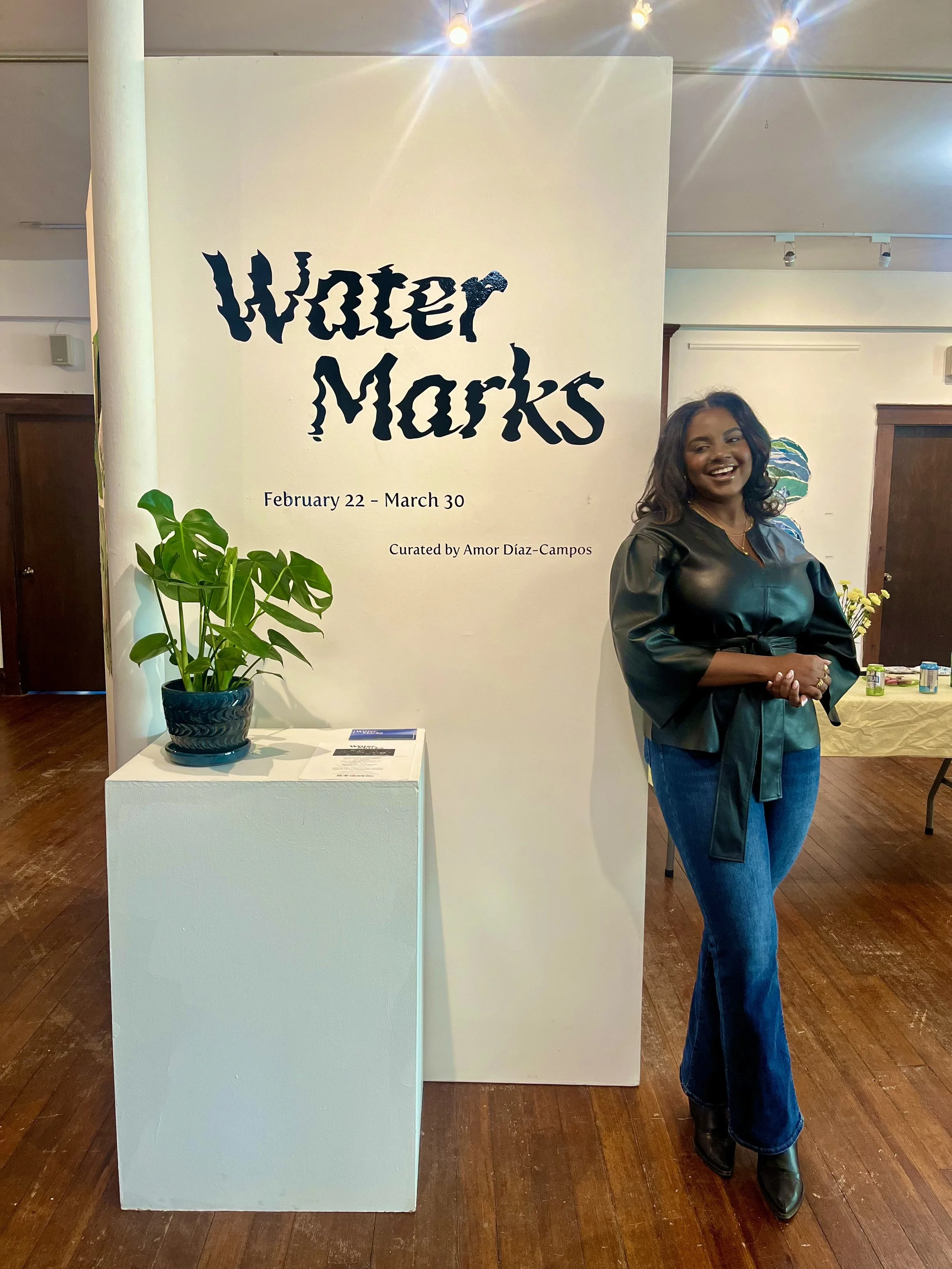CREATIVES AT WORK: PAIGE ROEHRIG & AMOR DíAZ-CAMPOS
From left to right: Emily Languedoc, Amor Díaz-Campos, and Paige Roehrig. Photography by AJOE_READON_PHOTOGRAPHY
“Ultimately, MASSCreative shows us that the more we bring people together, the more we can get done—and that advocacy, at its core, is an act of creative collaboration.”
THE PEOPLE SUPPORTING CREATIVITY IN OUR CITIES & TOWNS
Paige Roehrig and Amor Díaz-Campos are two sector leaders whose work we admire and collaborations we treasure. They are both cultural administrators based out of the Boston area who are using their positions within the creative sector to empower women and women-identified artists and arts professionals with mentorship, resources, coaching and career opportunities. In October, they launched their new nonprofit HerSector with co-founder Emily Languedoc to foster a sustainable and equitable future for women in the arts through collaboration, advocacy, and community building.
Additionally, Paige serves as the Executive Director of the Copley Society of Art in Boston, and Amor is an independent curator and Curatorial and Development Coordinator at the Boston Public Art Triennial.
We asked Paige and Amor to share with us how they got involved with MASSCreative and how our partnerships have supported their advocacy.
An Interview with Paige Roehrig and Amor Díaz-Campos
What’s your history with MASSCreative?
Paige: My connection to MASSCreative began during my time in the Boston University Arts Administration master’s program, where I had the privilege of studying under Executive Director, Emily Ruddock. Her class offered a deep dive into the function and importance of advocacy in the arts. How policy, communication, and coalition-building directly shape the creative sector. Later, I had the joy of seeing the MASSCreative team in action firsthand when we shared office space at the Cultural Equity Incubator at Midway Studios. That proximity allowed me to witness their commitment to advancing equitable creative infrastructure in Massachusetts and deepened my appreciation for their statewide impact.
Amor: I first learned about MASSCreative as a graduate student at Boston University, where I had the privilege of taking Emily Ruddock’s class. Her classes introduced me to the connection between arts administration and advocacy, especially how policy, funding, and organizing directly shape what artists and cultural workers are able to do. Later, while working at the Arts & Business Council of Greater Boston, I became more familiar with MASSCreative’s work since both organizations were part of the Cultural Equity Incubator. That experience gave me a firsthand look at how advocacy shows up day to day, in the conversations, collaborations, and small shifts that add up to real change in the creative sector.
What have you learned, or what skills have you gained, from participating in MASSCreative’s programs or advocacy campaigns?
Paige: Through MASSCreative’s work supporting the Creative Space Act, I learned how structured advocacy and collective vision can amplify the voices of individual artists and organizations. As a former team member of Western Avenue Studios & Lofts, this deeply impacted the work I did supporting programming within Creative Spaces. Their process demonstrated that when artists, administrators, and policymakers align around a shared cause, real systems change becomes possible. From them, I gained skills in strategic communication, organizing around shared values, and mobilizing creative networks. Skills I continue to apply in my own work leading within HerSector and at the Copley Society of Art.
Amor: Being exposed to MASSCreative’s work taught me that advocacy is part of our creative responsibility. It’s not something that happens on the sidelines, it’s woven into how we build communities, share resources, and support one another’s growth. I learned how to communicate about the value of the arts, connected to social change, well-being, equity, and belonging.
Amor Díaz-Campos
How are the skills, networks, experiences, or resources that you gained from these programs still supporting your advocacy and organizing?
Paige: MASSCreative’s model for uniting the arts community around clear priorities has directly influenced my work both with HerSector, a nonprofit I co-founded with Amor Díaz-Campos and Emily Languedoc to support women and women-identifying arts professionals, and at the Copley Society of Art, where I serve as Executive Director. At HerSector, we focus on empowering creative leaders through community-building, mentorship, and shared resources, echoing MASSCreative’s belief that collective effort leads to lasting impact. At Co|So, I’ve brought this same spirit of advocacy and inclusion into our programming. We’re expanding professional development opportunities, diversifying exhibitions, and cultivating spaces where artists can thrive. MASSCreative’s example continues to remind me that organizing people with intention and empathy can drive meaningful, systemic change in the arts.
Amor: MASSCreative continues to educate me and inform me about collaborations and shared purpose. Through HerSector, I’ve carried that approach into building a space where women-identifying artists and professionals can support each other, access opportunities, and speak openly about the challenges we face in the art world. My curatorial work also follows that same thread, using exhibitions and public programs to create dialogue, visibility, and connection.
Where are you directing your advocacy and community organizing right now?
Paige: Right now, my advocacy centers on equity, access, and sustainability in the arts. Through HerSector, I’m working to dismantle systemic barriers that impact women and marginalized professionals in creative fields by offering networking, mentorship, and skill-building programs. At Co|So, I’m leading efforts to make one of the nation’s oldest nonprofit art associations a more inclusive and supportive space for emerging and established artists alike. Both roles are guided by the same belief that underpins MASSCreative’s work: that collaboration and advocacy must go hand in hand to create a thriving, equitable cultural ecosystem.
Amor: Right now, my focus is on gender equity, representation, and access in the arts. With HerSector, we’re creating pathways for mentorship, leadership, and professional development for women in creative fields. In my role at the Boston Public Art Triennial, I’m also committed to ensuring that public art reflects the full diversity of our communities, not just in who is represented, but in who gets to make decisions and shape narratives. My work across both spaces is about making the arts more inclusive, transparent, and sustainable.
Why is it important to support MASSCreative and arts advocacy?
Paige: Supporting MASSCreative is essential because advocacy is not a solitary act, it’s a collective movement that requires structure, persistence, and vision. MASSCreative provides that structure for our sector. Their leadership demonstrates that when artists and organizations speak together, we can achieve transformative results. Their commitment to amplifying local voices and driving statewide action continues to inspire me in my own work. Whether building HerSector’s community of creative professionals or bringing artists together at Co|So to share, learn, and grow.
Ultimately, MASSCreative shows us that the more we bring people together, the more we can get done—and that advocacy, at its core, is an act of creative collaboration.
Amor: Because advocacy gives artists and cultural workers the structure and visibility they need to thrive. It ensures that creative people have a seat at the table when decisions are being made about resources, education, and community life. Supporting MASSCreative means strengthening the foundation that allows creativity to be seen not just as enrichment, but as essential to how we live and connect with each other.
Find Paige and Amor at:


